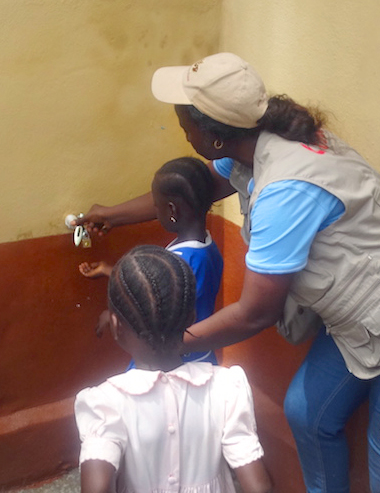The United Methodist Global Health Initiative has provided much-needed toilets and wells for primary schools in two rural communities where diarrhea and worm infestations have prevailed.
“Water is life and one who brings water to one’s community brings life to you,” Manjama local councilor Agnes Momoh told villagers at the dedication of the new facilities.
The goal of the project, which is part of the United Methodist Board of Global Ministries, is to reach a million children around the world by 2020.
The $65,000 provided a four-seater toilet and a hand-dug well for United Methodist primary schools in Manjama and in Fulawahun, both in the Bo District.

Health Coordinator Catherine Norman (center in cap) shows children of the United Methodist Church Primary School in Fulawahun, Sierra Leone, how to use a water faucet to wash their hands after using the toilet. Photo by Phileas Jusu, UMNS.
Excited Manjama villagers came out July 14 — the day of dedication — singing and dancing to drumbeats and the sounds of other local instruments. The children carried placards bearing messages of appreciation for The United Methodist Church, Global Health and the Sierra Leone Conference as they welcomed conference officials for the occasion.
Chief William Alpha of Manjama village said at the dedication that his 500 residents used to collect drinking water from a nearby stream. In the dry season, they are forced use even unhealthier alternatives, such as nearby swamps, to fetch water. The new well, he said, was treated and sealed off from contamination, thus secured and pure.
“When we had visitors coming, we would go to the UMC health center that has safe drinking water. We are now happy that a safe source of drinking water has been provided for our children who attend UMC primary school. But it is also going to serve the community as a whole and we will make sure that sanitary is preserved around the well and its purity is maintained,” the chief said.
Catherine Norman, health coordinator for the Sierra Leone Conference, said statistics collected at the local United Methodist Church health center showed high cases of worm infestation, diarrhea and malaria in the Manjama community.
She explained that the community drank from the same stream that contained sewage waste, thus compounding the already deplorable sanitary condition.
“With the provision of safe drinking water, we are sure cases of worm infestation and diarrhea will be minimized. Providing the children, who are the vulnerable group, safe drinking water we can prevent most of the infestations and likely fatalities emanating from such diseases,” she said.
The Manjama local councilor Momoh talked about how the education of village girls was hugely affected when there was no water in the community. It is girls who fetch water at the stream. That means the farther girls have to go to find water, the more their study time is affected and the more likely they are to drop out of school. Momoh encouraged the girls to concentrate on their studies, adding that if they learn well, they could, like her, command authority and men in their future places of work.
GLOBAL HEALTH ADVANCE
Your gifts to the Global Health Advance #3021770 will help to support holistic health programs in the U.S. and around the world. Donate online or learn more.
At Fulawahun, Resident Bishop John Yambasu appealed to the community to take care of the facilities assuring them, “We would love to come back to this community with new facilities instead of coming to repair old ones. We would love to come back and do more toilets for the communities.”
Couselor Augustine Abu, chairman of the Bo District Education Committee, said the district was pleased with the effort of The United Methodist Church.
“I will take the message of the good work I have seen to the deputy director of education,” he said, adding that the local council of government was supposed to be doing such projects in the schools but said they did not have the resources to do it because of the poor economy.
Abu said WASH programs were in high demand in the district and that Manjama and Fulawahun were blessed to have received the offers from The United Methodist Church. He encouraged the community to take very good care of the facilities. “Even at the district council level, there is a huge competition for projects and funds for rural water services because the need is everywhere,” he said.
The 2016 Malaria Indicator Survey, published by Sierra Leone’s National Malaria Control Programme, says two-thirds of households (64.9 percent ) reported water quality an issue. While the study did not undertake any water-quality testing, a quarter of households (26.9 percent) said that they took some action to make their water safer to drink.
The majority of Sierra Leonean households do not have access to improved sanitation. The situation deteriorated between 2005 and 2008 when the proportion of the population with improved sanitation decreased from 30 percent (24 percent urban, 6 percent rural) to 13 percent, the African Health Observatory reports in a profile of the nation.
Jusu is director of communications for The United Methodist Church in Sierra Leone.
News media contact: Vicki Brown at (615) 742 5470 or [email protected].
Like what you're reading? Support the ministry of UM News! Your support ensures the latest denominational news, dynamic stories and informative articles will continue to connect our global community. Make a tax-deductible donation at ResourceUMC.org/GiveUMCom.





